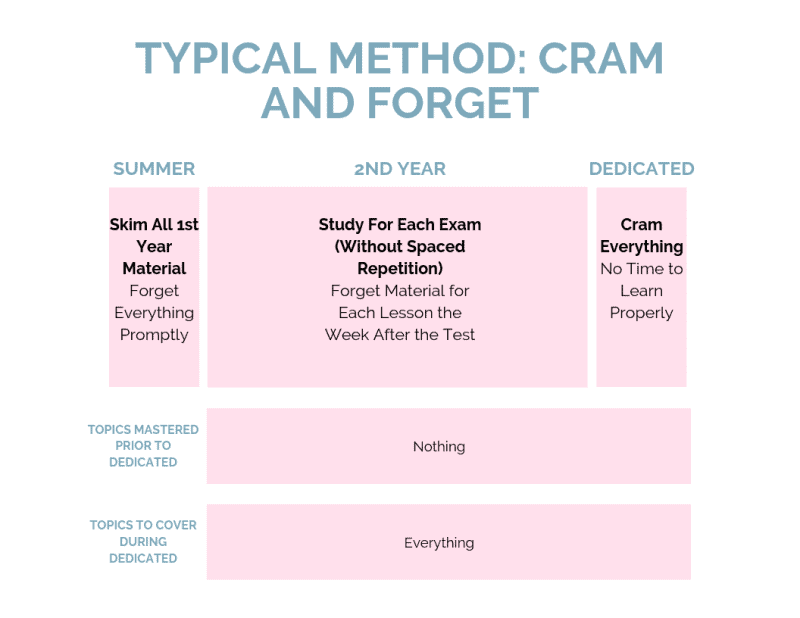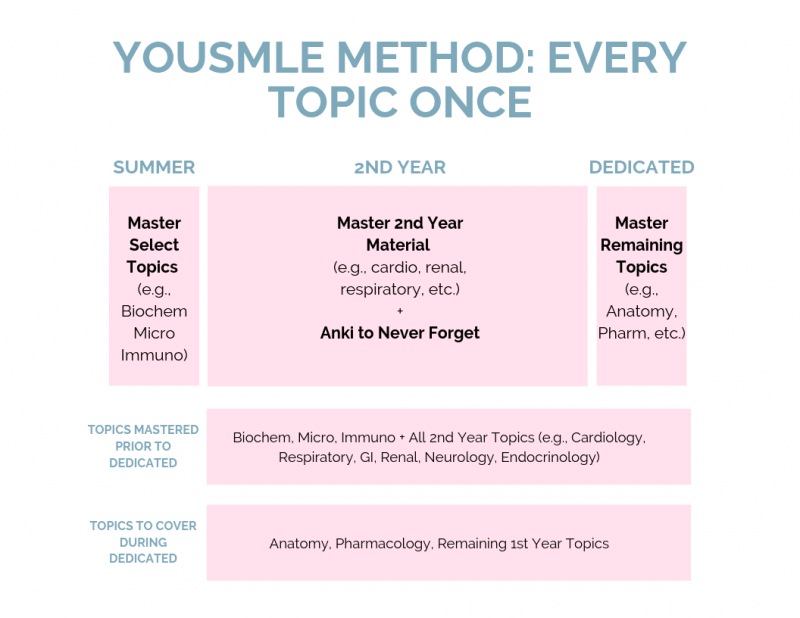

The summer before your second-year of medical school is critical in your Step 1 study plan. It’s an opportunity to consolidate what you’ve learned during your first year. It’s also a time to re-calibrate and establish new habits to set you up for second-year success.
But how do you best use the summer after your first year to study for Step 1? Or will you just forget everything anyway?
In this article, you’ll learn:
- How to study now, so your dedicated study is saner and more productive
- The best way to avoid wasting time re-learning material
- When to start using a QBank (and which one to use)
- Whether you should take a practice test during the summer, or wait until later
Invest the Time to Master the Material Now
Let’s start by looking at what it takes to get a good Step 1 score. I’ve written about this before (e.g., here and here). The core issue: getting med school exam questions right, often requires memorization. However, getting high Step 1 scores depends on mastery/understanding of the material. As such, plenty of med students may do well on their school’s exams, but underperform on the USMLEs.
Let’s be clear: the highest Step 1 scorers have mastered the most material. They didn’t cram it during their dedicated study.
As such, you should master as much as possible during the time leading up to your Step 1. But how? By covering each topic only one time.
Cover Each Topic One Time
If you take nothing else away from this article, remember this one idea:
Your goal should be to learn every topic only once.
To cover each topic once, master the subject when you learn it the first time. Then remember it forever by using spaced repetition.
Easier said than done.
What would this look like for a summer Step 1 study plan? To understand what you should do, let’s look at why the typical approach is wrong.
Typical Med Student Approach: Jack of All Trades, Master of None
The typical approach of med students is to cram for each exam, then promptly forget it. We’re so overwhelmed by the volume of information, we never stay on top of things.
The problem with the cramming approach becomes clear during dedicated study. By the time crammers reach dedicated study, most students are weak at everything. Because they have to cover everything again, they have only a few days to spend on each subject.
Can you learn cardiology in 4 days? No. Instead, students cram and don’t learn the material well enough to get a lot of Step 1 questions right. When their scores don’t improve, they try another “pass” of the content. But because they have even less time, the “pass” of UWorld or First Aid is even more cursory. The cycle continues.

Cramming before your dedicated study will lead to lower scores and more stress.
Notice how much time is wasted re-learning content. The subsequent time-crunch forces you to skim material and not learn anything properly.
Instead, what should you be doing in your step 1 study plan? Learn everything only once.
Next, let’s go through the four steps necessary to cover each subject only once.
1. Less is More: Select a Few Topics
A sure recipe for not learning something well is to try and cover too much material. If you tried to master the entirety of First Aid in 2 months, could you do it? Of course not. In the same vein, trying to cover everything from your first year during the summer is a recipe for disaster.
Instead, during the summer after your first year, you should focus on 2-3 subjects. For example, good summer study subjects would be biochemistry, immunology, and/or microbiology.
Remember, your goal is to minimize the study load for your dedicated study.

Proper Step 1 summer studying can make second-year and dedicated studying saner and more relaxed.
2. Master the Material
This bears repeating. Learning the material well the first time is the best ingredient for Step 1 success. So many Step 1 questions force you to apply knowledge. If you’ve only memorized words from First Aid – and not worked on applying the concepts – you’ll have to start over during dedicated study. Worst of all, the 1-2 month dedicated period lacks the time to master close to the amount you’ll need.
(To read How Are USMLE Questions Written? 9 Open Secrets for Impressive Boards Scores, click here).
But what if you don’t know where to start? If you’re in the Yousmle Online Course, the summer is a great time to get through the videos. Most students don’t know what it actually means to master a topic. In each of the Online Course videos, we’ll teach you the foundation for each subject. To make your studying more efficient, you can use the pre-made questions, so you never forget the topic.
If you haven’t experienced true mastery of a topic, you can check out the Online Course here.
3. Never Forget What You Master by Using Spaced Repetition
How do you make sure to learn every topic only once? By never forgetting what you’ve learned.
How often do we watch videos, then forget them the next day? How many lectures do we forget by not using spaced repetition (or even taking notes)?
To be blunt:
You’ll forget anything you don’t actively rehearse in spaced repetition.
Many students have heard the advice that they should do nothing during the summer. “Just relax! You’re going to forget everything anyway.”
The “don’t-study-during-the-summer” crowd is partially right. If you don’t use Anki, what you learn during the summer won’t make a huge difference. However, if you start to use Anki effectively, you can remember everything forever.
Do you struggle to make useful Anki cards? Or does making Anki take so long? If so, I’d recommend using the Yousmle Anki cards. You’ll master the material faster. Plus, because I’ve made the connections into Anki cards for you, you can learn more in less time.
Use the Yousmle Anki Cards to master and retain more information in less time.
4. Question Banks Clarify How You Should Study, Help with Application
Your priority should be to master the material and use Anki never to forget it. Once you’ve made mastery + retention a habit, it’s time to add a QBank to the mix.
Why is it essential to start using a QBank during the summer? First, as a soon-to-be second-year med student, you have no idea what USMLE questions are like. As such, you don’t have a good idea of how to study. How detailed are Step 1 questions? Should you sit and learn First Aid minutiae? By doing QBank questions early, you’ll be more confident in your preparations.
Second, using a QBank will reinforce the material you’re studying. Step 1 is about the application of the material. The best way to use knowledge is to apply it to vignettes.
I’d recommend doing questions in the subjects you’re studying. In other words, the weeks you’re studying biochemistry, I’d do biochemistry QBank questions.
The QBank settings I’d recommend:
- 5 questions/day. (It’s better to set a low goal you can consistently do, rather than a high goal that’s inconsistent. You can always do more questions if you finish your 5 for the day).
- Subject-specific, related to the subjects you’re mastering
- Kaplan. (Save UWorld until your dedicated study).
So, what would your summer step 1 study plan or schedule look like if you wanted to study everything only once?
How to Study During the Summer After First-Year
A typical med student’s summer involves research or other projects. For the sake of this article, let’s assume you’re working from 9 AM to 5 PM. As such, you won’t be studying full-time.
During 2 months, you may have time to cover 2 subjects well. (Let’s say you mastered biochemistry and immunology/microbiology). In other words, by the end of the summer, you should learn the First Aid sections for each of these topics.
Note that “learn” means to understand the topic in First Aid. It does NOT mean “skim” or “memorize random words.”
(To read The Worst Mistake Students Make with First Aid for the USMLE Step 1, click here.)
Then during your second year, you’d do the same thing with your classes. For each topic you learn in class, make sure you never have to review it again.
Learn every topic once.

Study everything only one time. You’ll feel better, and your scores will be higher.
In this approach, you spend more time mastering less material. The trade-off is that for the content you learn, you have less to cover during your dedicated study. This is different from the typical med student approach to studying.
If you only have to cover each topic once, your dedicated study will be calmer, and your Step 1 score higher.
Should You Take an NBME Practice Exam the Summer Before Second-Year?
The most accurate predictors of your final USMLE score are the NBME Self Assessments. They’re made by the same people who write the USMLEs. As such, it’s like taking the real exam.
As mentioned above, most students’ first Step 1 practice test is a rude wake-up call. Most of us assume that Step 1 is a test of memorizing random facts. When we take our first NBME Self Assessment, our plan to cram “Rapid Recall” flies out the window. Many realize we should have studied differently.
Doing QBank questions will give you an idea of what real Step 1 questions are like. However, doing an NBME Self Assessment will be an even more realistic simulation of the real exam. Wouldn’t you rather know what Step 1 is like before you start second-year?
Note: your first year may have only covered ~40% of the Step 1 material. However, a high score isn’t the point. Instead, use the experience to identify your gaps and hone your studying.
(To read NBME Self Assessments: Ultimate Guide for the USMLEs and Shelf Exams, click here.)
Concluding Thoughts
Learning every topic only once may feel overwhelming. However, it doesn’t have to be. Research suggests that it takes on average 66 days to establish a new habit. As such, the 2-3 months of summer are the perfect time to begin mastering the material and never forget it.
If you struggle with mastering material, check out the Yousmle Online Course. There, I teach you the fundamentals for each subject, so you can learn more in less time. Plus, with the pre-made integration/application questions, you can be sure you’re learning the material right, every time.
What do you think? Is it possible to learn everything only once? Should students really be taking a practice test during the summer? Let us know in the comments!
Photo by Ethan Robertson.







